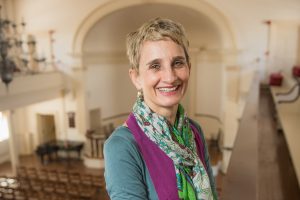Dear Friends,

Center for Religious and Spiritual Life Director, Matilda Rose Cantwell
We chose to highlight as our theme “Reflect, Resist, Rejuvenate” this year because we think these are the three ingredients we all need to live in the present historical moment, and, as general practices of the spiritual life. Or, to use a different metaphor, I suggest these three things as a pattern of movements in a “dance,” each piece drawing upon and giving rise to the other.
Reflect
Research by the Narratives Project (https://www.smith.edu/student-life/narratives-project) at Smith shows that those of us who cultivate “habits of reflection” have a more robust vision of where they are going in life. That doesn’t mean we need to know our future plans—seniors, I am talking to you. It means rather that we have a deeper self-understanding that helps us to identify our purpose or vocation in the world.
We all have some ways of reflecting. And yes—it’s true, excessive time with our screens can deplete our reflective energy and distract us from what is going on within. The reflective process is where we discover truths about ourselves, and thus it is how we discover truth itself, a commodity that we urgently need in this time of fake news. Thus the 20 minutes a day you spend walking alone, the half an hour a week you spend journaling, the religious service you attend, the dialogue group in which you participate, are all more important activities than you might think.
Resist
Resistance takes many forms. Political, social, internal. We encourage you to consider resisting labels– you do this when you identify with more than one religion, gender, or any other category. You do this when you say out loud that you don’t know yet, and that you are, like all of us, on a journey. Many of of us feel called to be part of the “resistance” to a world with increasingly nationalistic mentalities, a county that is hostile to the most vulnerable; or to climate change and its reverberations everywhere. Even political resistance happens in many different ways, and if you are not part of a movement, that does not mean you are not practicing resistance. The difference between resistance and social action, by itself, is that resistance can be like a spiritual, psychological boycott. Sometimes we need to boycott our own fear, to respond with honesty and dignity to macroaggressions–by holding our heads high, and taking a long, quiet deep breath—for sometimes the best response is no response at all.
One of the reasons we have lawn signs at the Helen Hills Hills Chapel that say “Black Lives Matter” and “No matter where you are from, we’re glad you’re our neighbor,” is in order to communicate that we are resisting any assumption that those who work in a building like ours, that looks like a protestant church, will stand by in complicity with injustice. For example, we resist the rejection of immigrants in need, the ban on U.S. entry based on religion, and the killing of black people by law enforcement.
Rejuvenate
To encounter truth, we must reflect. To make change, we need to resist. To sustain ourselves, we need to rejuvenate. Rejuvenation is not quite the same as relaxation. We relax, and we need to, through a wide variety of activities–watching Netflix, sitting around talking with friends, reading, taking a walk. But rejuvenation means to make new, re-fresh, return to a state of fullness and energy. Often when we are relaxing, sinking deep into rest—we are eventually faced with decisions—at what point does this begin to drain rather than rejuvenate me—should I really watch the fourth episode of this show, or should I turn out the light and go to sleep? In college it can be hard to deeply rejuvenate, as we rush from class to activity to homework. However, it helps to remember we can’t be at our best if we don’t stop to rest—and sometimes we have to rejuvenate intentionally—by writing , dancing, doing yoga, talking with a friend who brings mutual insight and clarity. When we are depressed or anxious or struggling with an addiction or illness, rejuvenation can be hard to come by.
I think that is where “surrender” comes in, and whatever we believe, we lean into the notion, that somehow we are not entirely alone in this universe, nor can we do everything alone. We cannot think our way into being rejuvenated. By the same token nor can we expect this practice or that church service or that yoga class or that lecture will give us everything we need. Ultimately, what we need for deep rejuvenation is inside us. But we often need a grounding, sometimes embodied activity to help bring it to the surface. We need water, light to rejuvenate what is already there.
We hope that each of our programs at the Center for Religious and Spiritual Life engage at least one of these critical pieces of being a human being, a person in 2019, and a student at Smith. Most importantly, remember that if you are curious about deepening your spiritual life; learning mindfulness practices; interacting with others with respect to moral and ethical questions or religious difference; participating in social justice work and community engagement; and practicing reflection; we invite you not to hesitate to find us. For you, that might be an act of resistance—to your own doubts or fears or preconceptions. Or, to return to the metaphor, we invite you to “come dance with us!”
With warmth,
The Reverend Matilda Rose Cantwell
Director of Religious and Spiritual Life, College Chaplain
mcantwel@smith.edu
